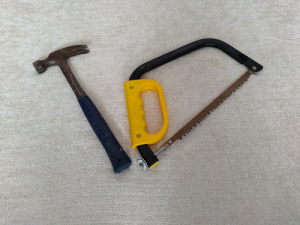1. Incorrect tool. When building a house, a carpenter would never try using a hammer to cut a 2×4. It was not designed for that. Likewise, a budget is just one of many financial tools. It is useful for planning how to spend, but, for example, wouldn’t be much good at deciding what job to apply for.
2. Incomplete Planning. Budgets are like the blueprints for building a house. If the blueprints are incomplete or drawn poorly, the resulting house will be a disaster. Similarly, a budget that doesn’t cover all income and expenses or is based on poor estimates will fail.
3. Insufficient Resources. Even with the “perfect” set of blueprints, a person who has insufficient money to purchase all the required materials, will not get a complete house. Budgets often fail because people plan beyond their available resources.
4. Little experience. A person who uses a hammer for the first time often bends nails, drives the nails in crooked, or pounds their fingers–ouch! It generally takes lots of practice to become skilled at using a hammer or any other tool. Budgets fail because of lack of experience; people often give up after a few months when their spending plan isn’t perfectly working.
5. Lack of Discipline. You can have the best plans and all the necessary resources, but if you can’t get the builder to show up and consistently work on the house, the house will never be completed. Budgets fail when a person lacks the discipline to consistently use and implement their plan.


